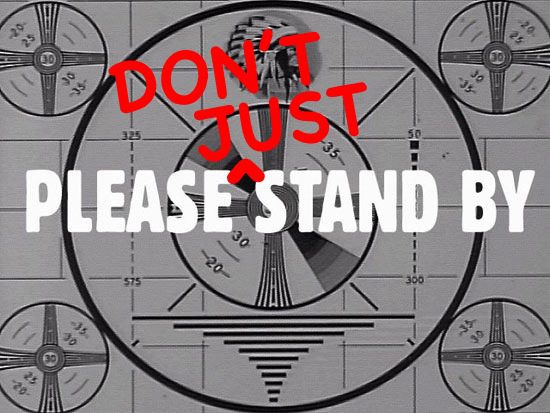That seems like a sweet, jangly bit of pure pop confection from Veronica Falls, until you listen to the twist of the blade in the lyrics: What’s your excuse, baby … For standing in the middle, waiting for something to happen?
Well, one excuse — probably more common than commonly admitted — is “I was afraid.” That’s what Servant No. 3 offers as his reason for standing in the middle, waiting, in a parable Jesus tells in Matthew’s Gospel. “I was afraid, and I went and hid your [money] in the ground,” the guy says.
He was playing not to lose. He was, above all, afraid of taking any chance that might get him in trouble. He was being civil and nice so as not to offend.
That didn’t end well. Standing in the middle, waiting for something to happen rarely does.
Briallen Hopper addresses this same fearful, noncommittal standing in the middle in a terrific essay at Killing the Buddha called “White People Problems.” Hopper’s first hook involves the recent Facebook-beloved advice column from Andrew W.K., which epitomizes the way that irresponsible timidity gets repackaged as a lofty, above-the-fray, “Third Way.”
“The world isn’t being destroyed by Democrats or Republicans, red or blue, liberal or conservative, religious or atheist,” W.K. wrote, “the world is being destroyed by one side believing the other side is destroying the world.”
Hopper writes:
I hated Andrew W.K.’s response, even though (like the almost quarter of a million people who shared it) I found a lot to agree with in it. I have a 63-year-old father with whom I deeply disagree about LGBT issues and abortion, and I still love him, respect him, and learn from him. My friendships with people across the political spectrum are important to me. And it’s hard to argue with Andrew W.K. when he says that that no one is perfect; politics are complicated; we should see each other as persons, not monsters; and love should be able to bridge barriers.
More than anything, though, what struck me about Andrew W.K.’s response was how white it was.
I don’t know anything about Andrew W.K.’s background beyond what an Internet search can tell me, but as a white American I do know this: It is a privilege to experience political differences as differences of opinion rather than differences of power. It is a privilege to be able to view all political issues in indistinguishable shades of gray. And, as I’ve been realizing in the month since Michael Brown’s death: It is a privilege when loving your political enemy means loving your father, not loving the man who killed your son — or the man who killed someone who might have been your son, or who might have been you.
Hopper sharply notes that Andrew W.K.’s formula starts to smell bad once you begin factoring in all the history, reality and power it neglects. Should we tell protesters in Ferguson, she asks, that “The world isn’t being destroyed by racism — the world is being destroyed by non-violent protestors believing that racism is destroying the world”?
The enthusiastic response to Andrew W.K.’s article doubtless speaks to some likable qualities in the citizens of Facebook: our recognition of our common humanity with people who disagree with us (or at least with people who disagree with us and are also related to us), and our desire for closer relationships with them. But it also speaks to the desire of so many of us privileged people to avoid all tension and conflict while still feeling like we are a force for good in the world. It’s a way of letting ourselves off the hook; of lulling ourselves into inaction by making neutrality into a positive good.
According to Andrew W.K., we don’t need to challenge our friends and family on the things that matter to the planet or to our less privileged neighbors: In fact, we probably shouldn’t. We can even label this evasion “love.” And we don’t need to sacrifice anything for our political beliefs — not our lives, not our time, not even a peaceful family dinner.













